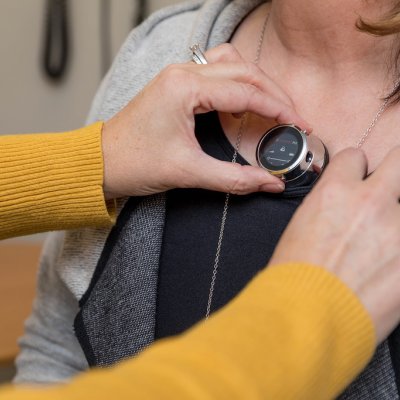
About the Program
Established in 1979, the Master of Science in Nursing (M.S.N.) at South Dakota State University prepares nurses for advanced practice in nursing administration, clinical leadership or education.
We feature collaboration and placement with over 200 established partnerships in a variety of local and regional clinical settings. Our clinical preceptors are engaged, caring healthcare professionals who provide an invaluable piece of our students’ clinical education.
Yearly annual fall admission and flexible scheduling allows students to finish the M.S.N. program in three to four and one half years. Total credits vary depending on the specialization chosen. No matter what you choose, we have programs in a variety of formats to meet your evolving needs.
Online Specializations
Program coursework is delivered online and includes a field-based practicum. The nurse administrator specialization prepares graduates to utilize concepts and theories from nursing management and health administration and to assume leadership positions in health care agencies. The graduate demonstrates skills in personnel management and budgetary resources. Upon completion of the degree, the graduate may be eligible for the following certifications:
- Nurse Executive-Board Certified
- Certified Nurse Manager and Leader
- Certified in Executive Nursing Practice
For required courses and more information, see the nurse administrator curriculum plan.
Program coursework is delivered online and includes a field-based practicum. The clinical nurse leader specialization prepares graduates for coordination of care and clinical leadership in all healthcare settings. The graduate demonstrates skills in managing microsystems of care and is prepared to implement outcomes-based practice and quality improvement strategies. Upon completion of the degree, the graduate may be eligible for the Clinical Nurse Leader certification.
For required courses and more information, see the clinical nurse leader curriculum plan.
Program coursework is delivered online and includes a field-based practicum. The nurse educator specialization prepares graduates to utilize theories of teaching and learning in a variety of settings with emphasis on nursing education. The graduate demonstrates the ability to plan, implement and evaluate nursing education programs. Upon completion of this degree, the graduate may be eligible for the Certified Nurse Educator certification
To help you reach your goals, we've developed a two-year and three-year curriculum plan. View the curriculum plans for required courses and more information, see the two-year nurse educator curriculum plan OR three-year nurse educator curriculum plan, depending on your needs.
At the completion of the program, the graduate will successfully demonstrate the following outcomes:
- Incorporate knowledge and theories from nursing and other supportive disciplines to promote and translate evidence into practice to effectively tailor health care to diverse populations.
- Use leadership strategies at the organizational and individual level to work with interprofessional teams to recommend quality improvement initiatives to provide safe healthcare delivery and improve population health.
- Assume accountability to influence health policy, improve healthcare delivery, decrease health disparities, and address the diversity of health care needs.
- Utilize informatics to enhance delivery of healthcare to a population.
- Communicate effectively with populations to improve health through population- centered strategies of health promotion/disease prevention education.
- Nurse Administrator: Analyze and apply a broad spectrum of administrative functions such as management principles and business skills to influence health care delivery systems (meets program Content Student Learning Outcome, Essential IX).
- Nurse Educator: Utilize acquired knowledge and skills to develop and implement a nurse educator evidence-based practice in a variety of settings (meets program Content Student Learning Outcome, Essential IX).
- Clinical Nurse Leader (CNL): Utilize microsystem assessment date to design, implement and evaluate evidence- based interventions that improve safety and quality for selected populations (meets program Content Student Learning Outcome, Essential IX).
Let's Talk
Our Nursing Student Services team is ready to help you find a path to meet your nursing goals. Fill out this online form and our staff will get back to you as soon as possible to answer your questions.
Virtual View of SDSU Nursing
Learn more about SDState's nursing program, faculty, learning facilities and more wherever you are.




